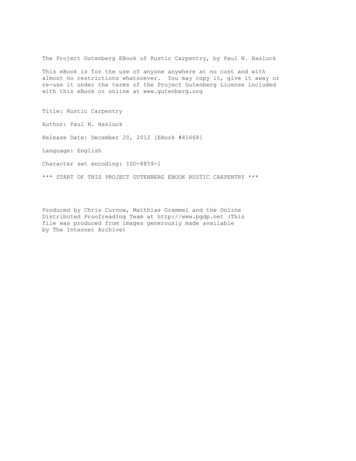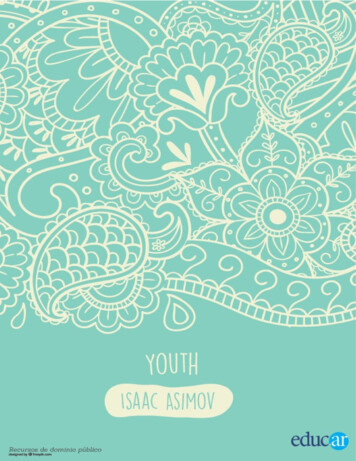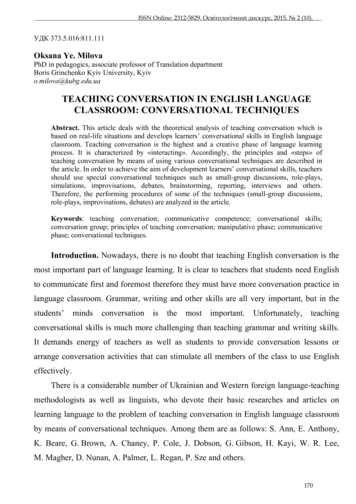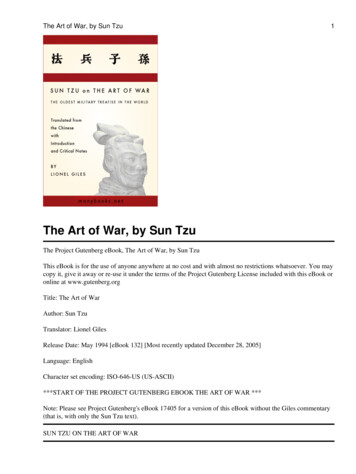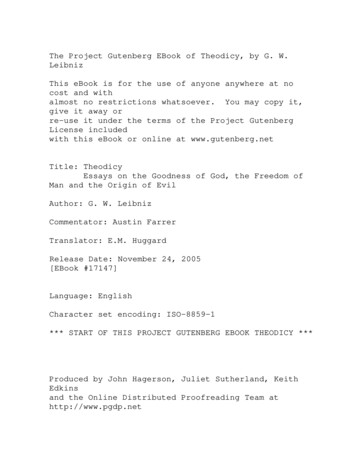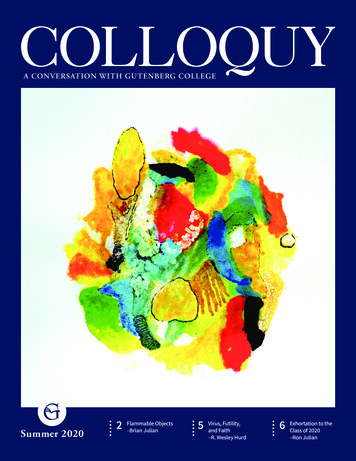
Transcription
A CONVERSATION WITH GUTENBERG COLLEGESummer 20202Flammable Objects–Brian Julian5Virus, Futility,and Faith–R. Wesley Hurd6Exhortation to theClass of 2020–Ron Julian
From the EditorColloquy’s cover painting is one ofa series of small spheres painted by R.Wesley Hurd. The paintings remindedme of the ubiquitous COVID-19sphere. I chose the painting on thecover because while reminding meof the virus graphic, it also conveys asense of movement and joy and hope—something we all need these days. Wessays that much of the imagery of hisspheres became visual analogies of howwe experience the world—beauty anddarkness, “worlds and wounds.” In“Virus, Futility, and Faith” on page 5,Wes points us to the true hope “seenthrough the lenses of faith.” Our firstarticle, “Flammable Objects” by BrianJulian, would also have us look throughlenses of faith. As we look at our presentcircumstances, may God give thoselenses to us all.Congratulations!FlammableObjectsBrian JulianBrian Julian (Gutenberg Class of 2003)received his Ph.D. in philosophy fromBoston University in 2015. He lives inMassachusetts with his wife, Melanie(Gutenberg Class of 2003), and theirtwo sons, Owen and Lucas. Briancurrently teaches at Boston Universityand Boston College. His website isthinkinginthelight.com.In early March, our apartment had a fire. The fire did not endanger our lives, and sincewe were in the middle of moving, it did not leave us homeless. We were—thankfully—unharmed, but the fire damaged our belongings. It burned, melted, and covered insoot the objects that were still in the apartment, about half of what we owned. In theweeks following, we spent day after day in the sooty apartment salvaging, cataloging, andphotographing those objects.So I have found myself thinking a lot about material things. This includes the mundane tasks of replacing items and listing them for the insurance, but I have especiallybeen thinking about how I should think about them. There are two easy answers to thisquestion, two default reactions to the destruction of physical objects: devastation andapathy. To put these reactions in terms of worldviews, one can adopt an outlook of materialism or of stoicism. My purpose here is to argue that neither outlook is satisfactory.Instead, when God is brought into the picture a middle way comes into view, one that issimultaneously harder and better. We must have faith.Materialism is deceptively easy to address. Everyone knows you are not supposed tobe a materialist in the sense of having your life revolve around possessions. Those whoviolate this principle are the villain of the movie or the character who learns at the endthat money can’t buy love. At the same time, however, materialism is incredibly attractiveand often seeps into our hearts unnoticed. So why do we amass things and invest suchvalue in them?Congratulations to Connor Clarkwho received the 2020 David W.Crabtree Scholarship. Although tutorsconsider both academic performanceand diligence when awarding thescholarship, their primary considerationis the student’s response to his or hereducation. The scholarship goes to thatstudent whom the tutors deem to havetaken the content of the curriculummost profoundly to heart. Such astudent takes seriously the issues raised,thinks about them, and allows the truthto change the way he or she thinksabout life and how to live.2Gutenberg CollegeA major attraction is control. When I have things, I can do what I want, when I want:I can control my abilities. Additionally, when I have X, I can be seen by others (or justthink of myself ) as the sort of person who has X: I can control my image. The attractionsof control for me can be illustrated with my book collection. A Great Books collegenaturally stokes a love of books, so as a graduate of Gutenberg I have not shied awayfrom collecting them. I take great pride in the variety of my books, and it is nice to havewhatever I want at my fingertips.The fire, however, removed my control. All but two of my books were still in our oldapartment. No books burned, but they all got bathed in smoke and covered in oily soot.As I write this, we are having them professionally cleaned, but we don’t know which aresalvageable. In the time since the fire, I have thought of many ways I would like to usethe books, but I have not been able to start these projects. There is also a sense in which Idon’t know how to think about myself. Am I still someone who has a good book collection? The damage to the books is one of the aspects of the fire that hit me the hardest. Iam tempted to be devastated.The Bible is clear about a relationship to objects that focuses on image and control.Not only is it unwise, but it is idolatry.S uM M e r 20 20
Do not lay up for yourselves treasures on earth, where moth and rust destroyand where thieves break in and steal, but lay up for yourselves treasures inheaven, where neither moth nor rust destroys and where thieves do not breakin and steal. For where your treasure is, there your heart will be also. No onecan serve two masters, for either he will hate the one and love the other, or hewill be devoted to the one and despise the other. You cannot serve God andMoney. (Matthew 6:19-21, 24)1It is foolish to find our worth in things or count on our ability to control them, sincethey are inherently perishable. They rust. They are stolen. They burn. But here Jesus isdoing more than giving practical advice. He is also warning that loving things is hatingGod, that our hearts follow our treasure. Materialism is idolatry. So whether we considermaterialism as simply unwise or as a rejection of God, it is not the way to view objects.Recognizing this, it is easy to swing to the other extreme. Immediately after the fire, Itold myself, “Oh well, the books are just things. I can live without them.” I was decidingnot to care about them. Or, better, I was trying not to care about them. Why would I tryto convince myself that I don’t care when I actually do? Because the opposite of materialism—stoicism—is also highly attractive. When compared to materialism its problemsmay not be as obvious, but as a way of thinking about objects it can also be problematic.Epictetus, a Roman stoic, gives one of the most helpful presentations of stoicism inhis Enchiridion (or Handbook). In it he holds out the benefits of stoicism as being “equanimity, freedom, and tranquility” (29).2 We can be at peace within our own minds. Thistranquility is such a great benefit because life often disturbs us with its pandemics, wars,and fires. However, as Epictetus would like us to understand, the real problem is that wefind life disturbing, not that it actually is:Men are disturbed, not by things, but by the principles and notions which theyform concerning things. Death, for instance, is not terrible, else it would haveappeared so to Socrates. But the terror consists in our notion of death that it isterrible. (5)Events in themselves are not bad, he is counseling. Instead, they are bad if we think themso. When it comes to my books, then, I was proceeding in the correct manner. I wasthinking about them as things I can live without, and in doing so I was bringing calmto my mind, rather than being upset by the effects of the fire. This can sound like goodadvice, particularly in comparison with materialism. Rather than overvaluing materialthings, I simply say that they don’t matter. I am apathetic. While there are times wherethis can be a helpful way to think (such as when I get a spaghetti sauce stain on my newwhite shirt), the stoic outlook arises out of a deeper, more problematic commitment.Epictetus makes this cornerstone of stoicism clear right at the beginning, when heexplains the most important distinction to recognize:Some things are in our control and others not. Things in our control are opinion, pursuit, desire, aversion, and, in a word, whatever are our own actions.Things not in our control are body, property, reputation, command, and, in oneword, whatever are not our own actions. (1)We can control how we think about things, what we pursue, what we want, and what weavoid. That is, we can control our minds. Everything outside our minds is also outsideour control. This includes ephemeral things, such as what others think of us, but alsoevery physical object we see and even our own bodies. Acknowledging this distinction isthe way to tranquility.Flammable Objects, continued on p. 4Scripture quotations are from The Holy Bible, English Standard Version (ESV ), copyright 2001 by Crossway, a publishing ministry of Good News Publishers. Used by permission. Allrights reserved.A CONVERSATION WITH GUTENBERG COLLEGESuMMer 2020 VoluMe 2, NuMber 4Editor Robby JulianColloquy team Eliot Grasso, Erin Greco,Walter Steeb, Chris SwansonCover Art R. Wesley HurdOther Photography Brian Julian (Classof 2003), Melanie Julian (Class of 2003),Robby Julian, Donovan Snider (Class of2023), Elizabeth Steeb (Class of 2009).Layout Robby JulianProofreaders Bob Blanchard, Karen Peters(Class of 2012), Walter Steeb (Class of 2009)Colloquy [kol-uh-kwee] is publishedquarterly by Gutenberg College.Gutenberg College offers anoutstanding four-year liberal artseducation in the Great Bookstradition in an environmentrespectful of biblical Christianity.President Chris Swanson, Ph.D.Provost Eliot Grasso, Ph.D.Dean Thomas (Charley) Dewberry, Ph.D.Website www.gutenberg.edu 2020 Gutenberg College, Inc.Permission to reprint in whole or in partis hereby granted, provided the followingcredit line is used: Reprinted by permissionfrom Colloquy, a publication of GutenbergCollege, www.gutenberg.edu.Subscription free upon request.Visit www.gutenberg.edu to subscribe.Gutenberg is supported primarily throughindividual, tax-exempt contributions.1Epictetus, Enchiridion, translated by Elizabeth html2S uMMer 2020Gutenberg College3
My artwork postfire. The pictureson the left and theright were drawnfor an art practicumat Gutenberg. Thepicture on the rightwas my room atGutenberg. Theframes melted.Flammable ObjectsContinued from page 3[Examine every event as to] whether it concerns the things which arein our own control, or those whichare not; and, if it concerns anythingnot in our control, be prepared tosay that it is nothing to you. (1)Stoicism, then, just as with materialism,is about control. With materialism, I tryto control my image or ability by acquiring things, and one problem is that thesethings, in turn, are out of my control.So I fail. Stoicism embraces this fact sothat I can remain in control. I just needto avoid caring about anything I cannotcontrol, and this leaves everything thatmatters to me firmly in my hands.One could question whether thismethod achieves the tranquility stoicismpromises, but I will not do so here. Instead, I will simply point out that stoicism is a lie. Events are not neutral;some are genuinely good, while othersare bad. This is vividly illustrated in apassage where Epictetus tries to advisethe opposite:If, for example, you are fond ofa specific ceramic cup, remindyourself that it is only ceramic cupsin general of which you are fond.Then, if it breaks, you will not bedisturbed. If you kiss your child,or your wife, say that you only kissthings which are human, and thus4Gutenberg Collegeyou will not be disturbed if eitherof them dies. (3)If my favorite mug breaks, then I cantell myself, “There are plenty of othermugs.” Similarly, if my family memberdies, I can tell myself that there are plenty of other humans. Upon reading this,my students invariably declare it to behorrible. Of course it is a bad thing whensomeone I love dies. Epictetus recognizesthat this common response is natural. Hejust argues it is one we must overcome.However, it is better to see this natural response as instead pointing at the truth—not only with regard to the human beingbut even when it comes to the mug.This truth can be seen in the Bible.While it certainly does not condonematerialism, neither does it take theposition that material things are nothing.Abraham was blessed by God, and thisresulted in Abraham being “very rich inlivestock, in silver, and in gold” (Genesis13:2). When the Israelites are instructedby God to build the tent of meeting andits furnishings, they are told to have itmade by a man filled with “the Spirit ofGod, with ability and intelligence, withknowledge and all craftsmanship, todevise artistic designs, to work in gold,silver, and bronze, in cutting stones forsetting, and in carving wood, to workin every craft” (Exodus 31:3-5). Godwants these things to be made well andbeautifully.Even Jesus, right after the exhortationnot to lay up treasures on earth, tells usthat material things matter:Therefore I tell you, do not beanxious about your life, what youwill eat or what you will drink, norabout your body, what you will puton. Is not life more than food, andthe body more than clothing? Lookat the birds of the air: they neithersow nor reap nor gather into barns,and yet your heavenly Father feedsthem. And why are you anxiousabout clothing? Consider the liliesof the field, how they grow: theyneither toil nor spin, yet I tell you,even Solomon in all his glory wasnot arrayed like one of these. Therefore do not be anxious, saying, “What shall we eat?” or “Whatshall we drink?” or “What shall wewear?” For the Gentiles seek afterall these things, and your heavenlyFather knows that you need themall. (Matthew 6:25-32)On a first reading, it may look like Jesusis endorsing a form of stoicism: life ismore than food and clothing, so don’tlet these things be of any concern toyou. But this is not his point, for he alsomakes the very un-stoic statement that“your heavenly Father knows that youneed them all.” God knows that we needthese things. We are physical creationswho live in a world of physical objects,and we can’t pretend like they don’tmatter. This passage tells us the key tothinking about the objects around us,but let me approach this message by wayof the fire again.Being in the old apartment after thefire was one of the strangest and mostdisturbing experiences of my life. Everything felt at the same time incrediblyfamiliar and utterly foreign. In trying toput my finger on what was so disturbing about seeing the ruined things, I wasstruck by my reaction to a blackened water pitcher on the kitchen counter. Thispitcher was nothing special. We havealready replaced it. Nevertheless, it wasdisturbing to see it lying on the counter, coated in soot. I realized the unsettling feeling arose from two conflictingthoughts that came simultaneously: 1)this is an item that I used and planned tocontinue using, and 2) this is an unusableobject. The thing that disturbed me wasmy lack of control.This is what Jesus is asking us to focuson when he turns our attention to theS um m e r 20 20
birds and the lilies, because the anxietyhe cautions against arises from desiringcontrol I don’t have. Instead, he is askingus to recognize that the one in controlis God, and in light of this, we need totrust Him. We need to have faith.There is nothing wrong with havinga pitcher or valuing books. If we avoidinvesting our identity in these thingsor using them to conform life to ourspecifications—if we avoid the dangersof materialism—then having them is agood thing. We should enthusiasticallyaffirm their goodness, rather than—likethe stoic—pretend that they are inherently nothing. This leaves us in theuncomfortable position, however, ofacknowledging that the good things inthe world, the things that we want andneed, are out of our control. This is whymaterialism and stoicism draw us: faithis hard. But if we listen to the message ofthe Bible, we know God’s character andknow that we can trust Him, even whendoing so is difficult. He knows what weneed and is committed to us.Why does God bring fires to destroythings that are good? Ultimately, thatknowledge is God’s alone. At the sametime, the Bible does speak of God’sflames not only in terms of destructionbut also in terms of purification:But who can endure the day of hiscoming, and who can stand whenhe appears? For he is like a refiner’sfire and like fuller’s soap. He willsit as a refiner and purifier of silver,and he will purify the sons of Leviand refine them like gold andsilver, and they will bring offeringsin righteousness to the Lord.(Malachi 3:2-3)I can say that God has used the trials ofmy life—including the literal fire—torefine my faith. I need to trust that thesovereign God knows what I need, evenwhen what I need is to lose what I want.I am surrounded by flammable objects,and when they burn it is a purifying firethat leads me to place my trust in God,preparing me for residence in a kingdomwithout moth, rust, or fire, a kingdomwhere the things around me will still beout of my hands but where I will havecomplete peace even without havingcontrol.S ummer 2020Virus, Futility,and FaithR. Wesley HurdArtist R. Wesley Hurd, Ph.D., was atutor and board member at GutenbergCollege until he retired in 2019.The cover painting on this issue ofColloquy is his work.We all find ourselves sharing a very unexpected world and community circumstance. We’ve all struggled at many levels of wonderment with howthis tangle of physical threat and social menaces has congealed into whatis a frightening stranglehold for millions. I will not here wade into the deep waters ofopinion and controversy. Instead, I find myself asking a spiritually intimate questionof myself. As I, loved ones, and communities face this bewildering threat, where aremy heart and mind?A darkness pervades today. Uncertainties abound. These uncertainties are felt inour bones—believers and unbelievers alike. It occurred to me that the writer of Ecclesiastes, Solomon (Keholet), has grasped the uncertainties of the world in a spiritnot unlike those forced upon us today by a deadly contagion.Solomon’s deeply pessimistic vision of life can be disturbing. Some would arguethat the picture of human existence Solomon paints is unnecessarily dark. Theywould argue that the redemptive promise and provision of God that the New Testament presents offers us much more than does Solomon’s picture. I agree that Christ’spromise ultimately and gloriously overcomes Solomon’s incomplete and pessimisticpicture. Clearly, however, the New Testament pictures struggle, pain, suffering, andonly fleeting kinds of fulfillment this side of the resurrection. Believers today justhave a clearer picture of God’s solution to the futility Solomon poetically described.Solomon’s vision of life and human experience in this world is a universal andoverarching picture of the futility to which we are ultimately bound in this presentlife. We share the same world with Solomon, where the peril of something likeCOVID-19 derives its energy and existence, where plagues have their permissionto exist within the inscrutable will of the transcendent Creator. God does not withhold tragedy, failure, and complex dilemmas from the lives of believers today. Goddoes not guarantee believers a kind of health and success in this world that can becompared to the existence that awaits us. This world, the Bible makes clear fromGenesis through the New Testament, is “subjected to futility” (Romans 8:18-25).And this futility—“wired into” a fallen, rebellious creation—results in an uncannyvoid of deep and lasting fulfillment in all human relationships, things, and accomplishments. Elements within this creation grant us fleeting tastes of beauty and goodthings, but the lasting things—things that stand the test of eternity—will not beours in this world. For those who look to God for ultimate peace, we must live withthe antinomies of death and God’s love and promise of eternal life.Seen through the lenses of faith though, futility (and pandemics) can become myspiritual tutor. The impact and our experience of the existential-spiritual pain fromCOVID-19 can remind me that living in this world—even as a believer—offers onlya pale fulfillment when compared to the kind awaiting me.Solomon’s cry, “Futility of futility, all is futility,” exudes the pain of uncertainmeaning when it rides the waves of what may be an unstoppable threat. In theseconditions, we all tend to look beyond ourselves for safety and hope. In today’sworld, that search for comfort takes many forms. For those of faith formed from thetruth of the Scriptures, we desire that hope to be in our God and Christ our savior.So let it be.Gutenberg College5
Congratulations,Graduates!Exhortationto the Classof 2020Gutenberg celebrated graduatingseniors Jordan Whiting and TrishaYeager at a commencement ceremonyon June 12. Jordon and Trisha cameto Gutenberg when the college was intransition. Several long-time facultyhad retired, and a new president andboard of governors had just been seated.In addition, during their four years,classmates who began the journey withthem left the college for various reasons.Jordan and Trisha persevered throughsome rocky times, each completingher studies at Gutenberg by writinga senior thesis that tutors passed withdistinction.Jordan, in her thesis, “The Divine Imperative: An Examination of the Intrinsic Dialectic between Existential Realityand Eternal Implications,” explored thenature of how one’s choices truly reflectthe reality of one’s existential commitments, wherein the difference betweenfaith that saves and faith that does notsave becomes explicitly discernible.Trisha, in her thesis, “To Raise HisFace to Heaven: An Apology for Seeking Purpose,” discusses how modernthought makes human purpose so individual as to obscure it and how, in herown search for purpose, she chose toreturn to the medievals, to see if theirideas about human purpose are trulyoutdated—or only forgotten.Ron JulianThis exhortation was given atthe Gutenberg commencementceremony on June 12, 2020.Ron Julian has been a tutor atGutenberg College since 1994. Heis the author of Righteous Sinnersand a co-author of The Languageof God: A Commonsense Approachto Understanding and Applyingthe Bible.I have spoken at a number of graduations. But I have never had to ask myself,“Would it be better for the audience ifI wear a mask?” I hope that in previousyears the audience has not been wishing Iwould wear a mask. But these days I amthinking about safety, for you and me, soI am keeping the mask on.A disciple is a student. Jesus is speaking as a rabbi, a teacher, talking to hisstudents. He is saying, “I am a teacher,and those who are truly my studentswill stick with my teaching, will hang inthere with me. Those who do will cometo know the truth, and it will make themfree.”When Jordan and Trisha asked meto speak briefly on something from theBible, I thought of Jesus’ words fromJohn 8:31:There are several reasons why Ithought this passage was very fittingfor us today. As students at Gutenberg,Jordan and Trisha have talked a lot abouttruth. Can we know it? How can we livein it? Western culture has experienceda long, slow decline in confidence thattruth can be known. And yet, here isJesus saying that there is a truth, andit can be known. He, the teacher, canbring his students to an understandingof that truth.If you continue in My word, thenyou are truly disciples of Mine; andyou will know the truth, and thetruth will make you free.The teachers at Gutenberg have talked a lot with Trisha and Jordan abouttruth, but we have tried to make it clearthat we make no guarantees. We cannotclaim that being our students will infallibly lead to truth. In one sense, we areteachers. But in a deeper sense we arestudents just as the Gutenberg studentsare. We have confidence, though, thatour teacher, the Lord Jesus, does knowthe truth and can ultimately lead us toit. So on the one hand, what Jesus sayshere is incredibly comforting. Jesus, ourteacher, knows the truth that leads tofreedom, and he can make us know thattruth as well.6Gutenberg CollegeS um m e r 20 20
On the other hand, what Jesus sayshere is also incredibly challenging. It allhinges on his opening phrase, “If youcontinue in my word.” Other translations have “abide” or “remain.” The reality is that many of Jesus’ disciples, students, did not continue in His teaching.They heard what he taught, and thenthey walked away.That can be seen in this very passage.When Jesus said this, his Jewish listenersdid not respond by saying, “That is fantastic! You can show us the truth! We canfind freedom!” Instead, they thought,“Wait a minute. What do you mean‘make us free?’ Are you implying we aresome sort of slaves or something?” Johntells us what they said to Jesus in John8:33:Today we are congratulating Jordanand Trisha for staying the course. Theycompleted the curriculum at Gutenbergunder difficult circumstances. We arevery proud of their accomplishment.But even though they are done beingGutenberg students, they will never bedone being students of Jesus. For them,as for all of us, there is the challenge offinishing the greatest and most challenging curriculum. The news Jesus bringsis great. We are not left on our own tostumble toward truth. Ultimately, in theend, Jesus is a teacher who can and willlead us to that truth. And the result willbe freedom and life. But as a teacher,Jesus makes great demands. We have tostick with the curriculum, even when itgets tough. We will never find freedomand life if we drop this class.So I want to praise how Trisha andJordan hung in there as Gutenberg students. Their perseverance is a model andreminder for us all. Because we all facethe challenge of persevering in the schoolof Jesus.We are Abraham’s descendantsand have never yet been enslavedto anyone; how is it that You say,“You will become free”?As potential students, they are alreadythinking, “Hey, we are not sure we buythis.” Jesus answered them:Truly, truly, I say to you, everyonewho commits sin is the slave of sin.The slave does not remain in thehouse forever; the son does remainforever. So if the Son makes youfree, you will be free indeed.Now Jesus is getting very personal.The freedom that you need is freedomfrom your own evil. When Jesus speaksof freedom, that sounds great. But in factit is only good news if we accept his diagnosis of our desperate condition. There issomething wrong with us. We are slavesof sin. By ourselves we can never breakfree of our slavery to sin. And as Jesusmakes clear, sin leads to judgment. Andjudgment leads to death.To be a student of Jesus means persevering when Jesus confronts us withtruths that we may not like, truths suchas these: We need to change the way werelate to God. We need to change theway we relate to other people. We needto change our view of what is really valuable in this world. And we really needto change how we think about ourselves.Jesus is a hard teacher. Being students atGutenberg is a piece of cake compared tobeing students of Jesus.S ummer 2020Gutenberg College7
Summer 20201883 University StreetEugene, OR 97403541.683.5141 office@gutenberg.eduwww.gutenberg.eduJoin the Conversation! Apply Now for Fall 2020.gutenberg.edu/admissionsBoard Matching Campaign &Gutenberg Giving Day August 8Gutenberg will award over 75,000 in grants for studentfinancial aid this year. The Board of Governors, as part oftheir annual summer Matching Campaign, has pledged 12,900 for student financial aid. Our goal is to matchthat amount by Gutenberg Giving Day on August 8. Youcan help give students an excellent education by makinga contribution here: gutenberg.edu/get-involved/giveSUMMER INSTITUTE 2020EDUCATION CONFERENCE 2020Struggle and HopeThe Art of LearningAUGUST 6-8SEPTEMBER 3-5GUTENBERG.EDU/SIGUTENBERG.EDU/EDCONLife is hard. Most literature and art producedby human beings over the centuries is about suffering, troubles, and struggle. We all experience suchtroubles in our own lives. And of course, this is oneof the major themes explored in the Bible. “Throughmany tribulations we must enter the kingdom of God”(Acts 14: 22). And yet Paul tells us that we also exult inthose tribulations (Romans 5:3). The struggle of faithis in part a struggle to hold on to meaning and hopein the face of the sufferings brought upon us by theworld, by each other, and by ourselves. Join us at thisyear’s Summer Institute to explore the challenge ofgrowing in hope as we face the struggles of life.In the predominant view of education, the student’sprimary job is to consume and store information, muchlike a computer. But such a view misses the true natureof learning. Learning is a dynamic process in which astudent, like an apprentice, slowly builds skills andknowledge, constantly self-correcting toward masteryand a sound worldview. A key component of theprocess—frequently overlooked in modern education—is a student’s moral orientation toward truth. In thisconference, we will explore the art of learning throughtalks and workshops in order to become better learnersand better teachers.Because of the uncertainties of COVID-19,Gutenberg is offering a Zoom option for participants.They will be able to see the lectures and participate inZoom-only discussions. See the website for details.The conference will feature nationally recognizedspeakers: Nancy Pearcey, author of Total Truth; AndrewPudewa, founder of the Institute for Excellence in Writing;Leigh Bortins, founder of Classical Conversations; andJohn Seel, author of The New Copernicans.If Gutenberg must cancel due to COVID-19 restrictions, participants will be refunded their full registration fee.
Epictetus, a Roman stoic, gives one of the most helpful presentations of stoicism in his Enchiridion (or Handbook). In it he holds out the benefi ts of stoicism as being "equa-nimity, freedom, and tranquility" (29).2 We can be at peace within our own minds. Th is
